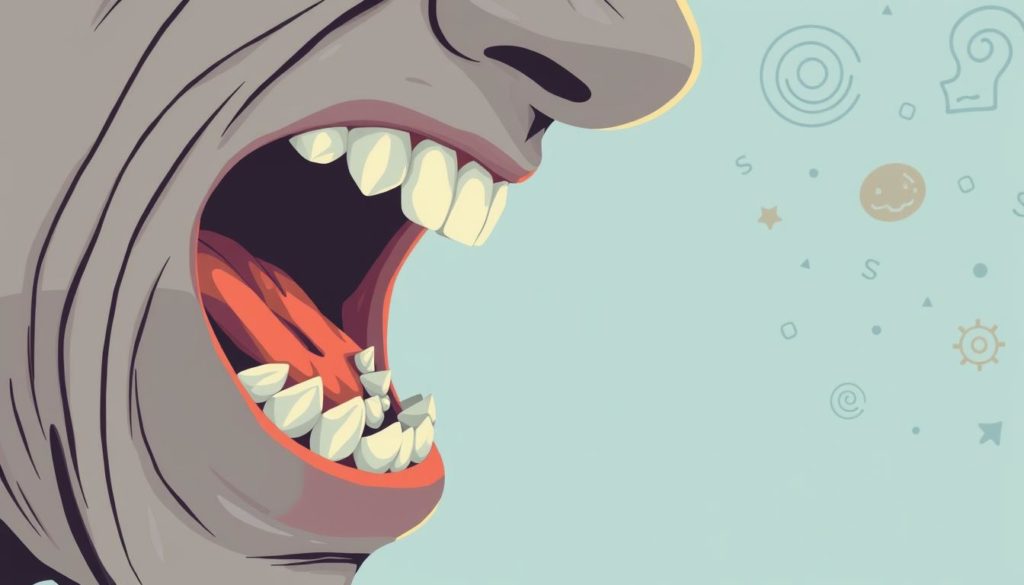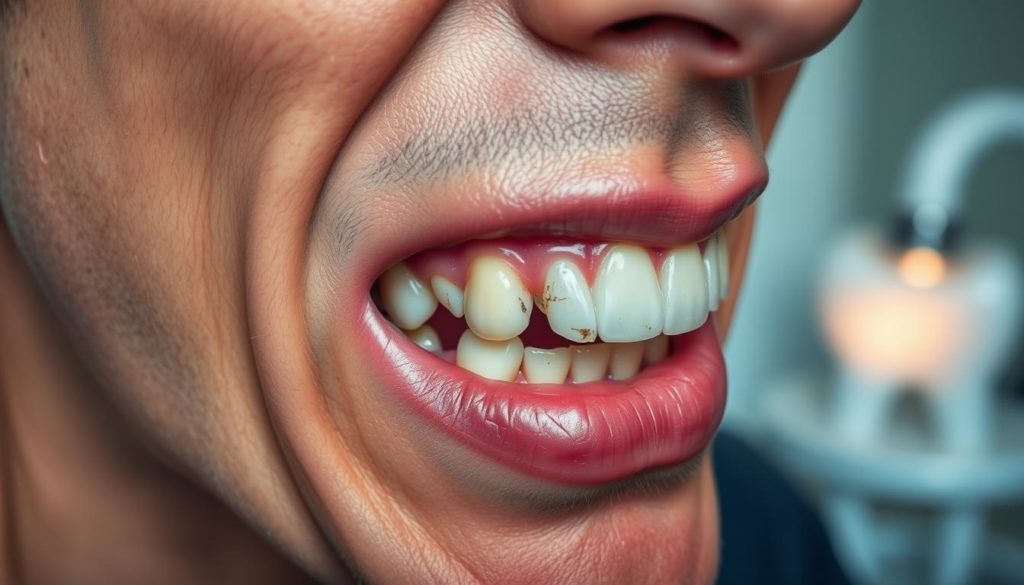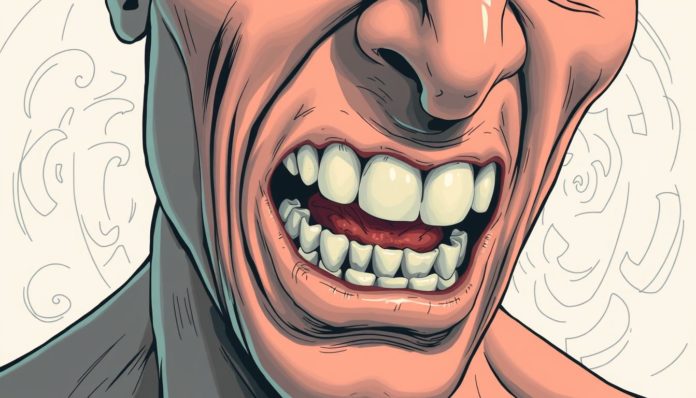Did you know that up to 31% of people grind their teeth? This condition, known as bruxism, happens to many. It involves clenching, grinding, or gnashing teeth. This can happen during the day or at night and affects both kids and adults.
Bruxism symptoms include morning headaches and unexplained facial pain. The Cleveland Clinic says these might show poor sleep quality. It’s key to find how to stop this to avoid disruption.
It’s vital to tackle bruxism symptoms head-on. Custom mouth guards are a top recommendation. They help manage bruxism, bringing relief and protecting your teeth.
Understanding Teeth Grinding and Clenching
Teeth grinding and jaw clenching, or bruxism, can happen both awake and asleep. They’re usually involuntary and can cause dental and health problems.
What is Bruxism?
Bruxism means you clench or grind your teeth without realizing it. It can occur both during sleep and while you’re awake.

Sleep bruxism is known as a sleep-related movement disorder. It might happen along with snoring or sleep apnea. On the other hand, awake bruxism is often due to stress or anxiety. It makes people grind or clench their teeth in the daytime.
Subconscious Habits
Subconscious teeth grinding, especially at night, stems from the central nervous system’s activities during sleep. This involuntary action might remain unnoticed unless a partner points it out or a dentist finds it during a check-up.
It’s important to know and tackle jaw clenching and subconscious teeth grinding. If not handled, these habits can seriously harm oral health.
Symptoms of Teeth Grinding (Bruxism)
It’s important to spot teeth grinding, or bruxism, early. It shows up through physical and emotional signs, impacting well-being.
Physical Symptoms
Bruxism’s physical signs can be clear and sometimes harsh. Common teeth grinding signs include:
- Damaged or worn teeth
- Sore or tight jaw muscles
- Headaches, especially upon waking
- Facial pain
- Earache-like discomfort
These symptoms show the strain from grinding and clenching. They can mess with sleep. The grinding noise might be heard by partners at night.

Emotional and Psychological Symptoms
The emotional effects of bruxism are just as big. People with bruxism might feel:
- Increased stress and anxiety
- Mood swings
- Fatigue from disrupted sleep
Addressing these emotional effects of bruxism means dealing with the stress and tension causing the grinding. The goal is a full treatment approach.
Causes of Teeth Grinding
Knowing why people grind their teeth, or bruxism, can help find ways to reduce its harm. Stress, sleep problems, and certain drugs all play a big part. Let’s look closer at these key causes and their effects.
Stress and Anxiety
Stress and worry are big reasons behind bruxism, causing teeth to grind during tense times. When we’re very stressed, our muscles get tight. This can make us grind our teeth without knowing it. Things like work stress, emotional upset, and daily challenges make it worse.
Sleep Disorders
Problems during sleep are often linked to bruxism. Sleep apnea, for example, messes with how we breathe. This can make the brain tell the body to start grinding teeth. Those with sleep issues might grind their teeth at night and not know it.
Medications and Substance Use
Certain drugs and substances can lead to bruxism too. Things like coffee and smoking, along with some types of antidepressants, increase the risk. These can change brain chemicals and make muscles more active, causing teeth to grind.
Who is at Risk for Bruxism?
Various factors can make someone more likely to grind their teeth. It’s important to know who might be at risk. Children often grind their teeth, making them a high-risk group. People who are aggressive or competitive might also be more prone to do it.
Family history plays a big part in teeth grinding. If your family has a history of bruxism, you might be at risk too. Conditions like GERD, Parkinson’s disease, and ADHD can increase this risk.
- Youth – more prevalent in children.
- Personality types – aggressive, competitive individuals.
- Genetic factors – family history of bruxism.
- Other medical conditions – GERD, Parkinson’s, ADHD.
Lifestyle choices like drinking alcohol, smoking, or having too much caffeine can make grinding worse. Certain medications can also contribute to this issue.
| Bruxism Risk Factors | Implications |
|---|---|
| Young Age | Higher prevalence among children |
| Aggressive Personality | Increased incidence of bruxism |
| Genetic Predispositions | Family history influences risk |
| Medical Conditions | GERD, Parkinson’s, and ADHD are linked to bruxism |
| Lifestyle Choices | Alcohol, tobacco, caffeine heighten risk |
Types of Bruxism: Awake vs Sleep Bruxism
It’s important to know the different kinds of teeth grinding for good treatment. There are mainly two kinds: Awake bruxism and Sleep bruxism. They may look similar but have big differences.
- Awake bruxism: This happens during the day. It’s often linked to stress, anxiety, or deep focus. People might clench their teeth when doing tasks like working on a computer or driving.
- Sleep bruxism: This happens during sleep and is a sleep disorder. People don’t know they’re doing it, which can lead to worse dental issues. Knowing how sleep bruxism differs is key to finding the right treatment.
Here’s a quick overview to spot the main sleep bruxism differences:
| Characteristics | Awake Bruxism | Sleep Bruxism |
|---|---|---|
| Time of Occurrence | During the day | During sleep |
| Common Triggers | Stress, anxiety, focused activities | Neurological factors, sleep disorders like sleep apnea |
| Awareness | High awareness | Low awareness |
| Treatment Approaches | Behavioral strategies, stress management | Dental guards, addressing underlying sleep disorders |
Understanding the difference between awake bruxism and sleep bruxism helps. This way, patients and healthcare providers can make better treatment plans. They will address the specific type and its causes.
Diagnosing Teeth Grinding (Bruxism)
It’s key to spot bruxism early to avoid harm to teeth and other dental problems. There are two main ways to figure out if someone grinds their teeth: checking the teeth and studying sleep.
Dental Examinations
Dentists start by examining the mouth for signs of teeth grinding. They look for things like tooth damage, worn-out enamel, and pain in the jaw. These checks reveal if bruxism is happening and how bad it is.
Seeing the dentist regularly helps catch teeth grinding early. This means it can be managed before it gets worse.
Sleep Studies
If sleep problems might be causing the bruxism, doctors may ask for a sleep study. This test, called polysomnography, tracks sleep, breathing, blood oxygen, and muscle movement. It shows if sleep bruxism is happening and if it’s linked to other sleep issues.
The American Academy of Sleep Medicine says these studies are important. They help make a good plan to treat bruxism.
| Method | Procedure | Indicators |
|---|---|---|
| Dental Examination |
|
|
| Sleep Study for Bruxism |
|
|
Complications of Untreated Bruxism
Not treating bruxism can lead to severe and often painful issues. Catching it early can stop many problems. This improves life quality.
Dental Damage
Bruxism complications are most clear in the damage to teeth. Constant grinding wears down enamel and can break teeth. Tooth loss can even happen. This constant grinding also makes teeth more sensitive. It becomes painful to enjoy hot or cold foods and drinks.
Jaw Disorders
Grinding teeth can harm the temporomandibular joint, known as TMJ from teeth grinding. It can cause headaches, face pain, and make it hard to chew. This stress can inflame the jaw muscles. It may lead to more severe problems if not treated.
Sleep Disruptions
Untreated bruxism hurts sleep quality too. Many with sleep issues from bruxism wake up often and sleep poorly. This can even lead to sleep apnea. Such sleep problems cause tiredness. This impacts daily life and overall health.
| Complication | Description |
|---|---|
| Dental Damage | Enamel wear, tooth fractures, sensitivity, and tooth loss |
| Jaw Disorders | Chronic headaches, facial pain, inflammation of the TMJ |
| Sleep Disruptions | Frequent awakenings, restless sleep, potential sleep apnea |
Effective Solutions for Bruxism
Finding the right bruxism treatment is key for people who grind their teeth. Many options exist to help manage this. Here are some effective solutions for managing teeth grinding:
- Customized Mouth Guards: These are made by dentists to protect your teeth while you sleep.
- Stress Reduction Techniques: Using relaxation exercises, meditation, or yoga can help lessen the stress that causes bruxism.
- Proper Sleep Hygiene: A regular sleep schedule and a cozy sleep space can help reduce teeth grinding at night.
- Botox Injections: Botox can sometimes be used to calm the muscles involved in teeth grinding.
- Dental Corrections: Fixing misaligned teeth might lessen the pressure and stop the grinding.
Managing teeth grinding well means figuring out and dealing with the main causes. Whether stress or a sleep issue, it’s crucial to identify the real problem for a lasting solution. Looking into these bruxism remedies can provide relief and protect your teeth from more damage.
| Solution | Benefits | Considerations |
|---|---|---|
| Customized Mouth Guards | Protects teeth, reduces wear | Requires professional fitting |
| Stress Reduction Techniques | Reduces anxiety, improves overall well-being | Requires consistent practice |
| Proper Sleep Hygiene | Improves sleep quality, reduces grinding | May take time to establish |
| Botox Injections | Reduces muscle tension | Requires medical consultation |
| Dental Corrections | Aligns teeth, reduces pressure | May involve dental procedures |
The Role of Nightguards in Bruxism Management
Bruxism nightguards, or occlusal splints, are key in managing teeth grinding. Especially when sleeping. These mouthguards create a barrier between your upper and lower teeth. This prevents the enamel from wearing down due to constant grinding.
Dentists custom-make nightguards for a perfect fit. This ensures they’re both comfortable and effective. Their design is specific to each person’s bite and teeth arrangement. This specificity not only protects the teeth but also eases jaw muscle strain. This brings relief to the wearer.
Moreover, nightguards play a crucial role in a broader treatment plan for bruxism. For more in-depth information on how to manage this condition, including the use of nightguards, visit this comprehensive resource. Using them correctly can really help to lower the risks of bruxism. This ensures better dental health overall.
FAQ
What is Bruxism?
Bruxism is the act of grinding or clenching teeth without realizing it. This can happen during the day or night.
What are the physical symptoms of bruxism?
Can bruxism affect my sleep?
Yes, it can harm your sleep quality. It might lead to sleep issues like apnea. Your partner may also hear you grinding your teeth at night.
What are the emotional and psychological symptoms of bruxism?
It often leads to feeling stressed, anxious, or frustrated. These feelings can make bruxism worse.
What triggers bruxism?
It can be caused by stress or anxiety. Sleep problems, certain medications, and substances like caffeine can also trigger it.
Who is at risk for bruxism?
People at risk include the young and those with a competitive spirit. Genetics, some medical conditions, and lifestyle habits also play a role.
What’s the difference between awake bruxism and sleep bruxism?
Awake bruxism is often due to stress. Sleep bruxism is a disorder linked to other sleep issues.
How is bruxism diagnosed?
Diagnosis includes dental checks for wear on teeth. Sleep studies might also be used to identify the condition.
What complications can arise from untreated bruxism?
Not treating bruxism can cause dental problems and chronic pain. It might also lead to disorders of the jaw joint and poor sleep.
What are some effective solutions for bruxism?
Solutions involve mouth guards and stress relief. Good sleep habits and dental procedures might also help. In some cases, Botox is an option.
How can nightguards help manage bruxism?
Nightguards prevent teeth damage from grinding. Dentists custom-fit them to lessen jaw strain and stop dental harm.


